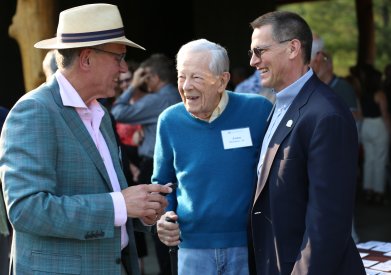Professionalism and Social Justice
April 25, 2017
The winners of the 2016 John. A. Benson Jr., MD Professionalism Article Prize were announced on April 25, and for the seventh year in a row I am pleased to see such high-quality pieces exploring professional behaviors and values as they apply to present-day health care.
This year’s winners explored timely issues and challenges facing medical professionals, including recognizing and overcoming structural racism; how to provide better care to disenfranchised populations; and teaching professionalism to future physicians.
The 2016 Article Prize winners are:
- “Remembering Freddie Gray: Medical Education for Social Justice” by Delese Wear, PhD, Joseph Zarconi, MD, Julie M. Aultman, PhD, Michelle R. Chyatte, DrPH, and Arno K. Kumagai, MD
In this August 2016 Academic Medicine perspective, the authors explore recent high-profile killings of young black men, and how patients’ experiences may differ drastically from the lives of medical students tasked with caring for them. The authors note that while current medical curricula cover health disparities, they rarely examine the broader societal forces that can lead to discrimination and affect patient outcomes.
- “Structural Racism and Supporting Black Lives — The Role of Health Professionals” by Rachel R. Hardeman, PhD, MPH, Eduardo M. Medina, MD, MPH, and Katy B. Kozhimannil, PhD, MPA
Published in the December 2016 issue of The New England Journal of Medicine, this perspective highlights how structural racism can undermine health care workers’ best efforts to provide equal care. While the authors believe most physicians are not explicitly racist, they note that most physicians operate in a racist system. Furthermore, the authors posit that it is incumbent on clinicians and researchers to use their power, privilege and responsibility to dismantle this structural racism.
- “Parting the Clouds: Three Professionalism Frameworks in Medical Education” by David M. Irby, MDiv, PhD, and Stanley J. Hamstra, PhD
Published in the April 2016 issue of Academic Medicine, this piece outlines three frameworks that have evolved in the medical education community to teach professionalism: “virtue-based” focuses on the development of moral character and reasoning; “behavior-based” emphasizes milestones, competencies and measurement of observable behaviors; and “identity formation” focuses on a physician’s identity development and socialization into a community of practice.
Each year, the articles chosen by the committee seem to reflect the zeitgeist. In 2016 the focus of professionalism appears to have shifted from an examination of physician burn-out and remediation (topics of the 2015 prize winners) to one of overcoming external influences inherent in society at large. This shift reflects an interesting realignment of professionalism with the principle of social justice, as articulated in the Physician Charter. While in previous years, professionalism as explored in the winning articles has focused more on how physicians navigate the system and each other, it feels as though there is a renewed commitment on the part of physicians to be an advocate for community health, not just that of the individual patient.
It will be interesting to see if this theory of mine pans out for articles published in 2017. There are so many challenges facing those working in health care, as well as the patients they treat. Will this reenergized sense of advocacy hold true through the year? There certainly is a lot to tackle.
In the meantime, congratulations to all of the 2016 winners. And thank you for reminding all in the profession of our larger commitments to society.

Daniel B. Wolfson
EVP & COO, ABIM Foundation


